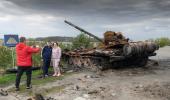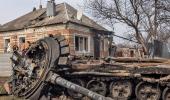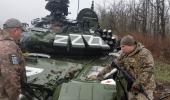'Putin is in danger of losing face in his Ukrainian adventure. His bluster is a response to this.'

Dr R Rajaraman, emeritus professor of theoretical physics at JNU and former co-chair of the International Panel on Fissile Materials, was the only nuclear scientist from India to attend the prestigious Amaldi Nuclear Conference in Rome last month attended by nuclear experts from around the world. The conference was also attended by two of Russia's best known nuclear strategists.
"One can safely say President Putin will not use a nuclear weapons against Ukraine," Dr Rajaraman tells Rediff.com Senior Contributor Rashme Sehgal.
President Putin has warned that Russia is prepared to retaliate against 'unacceptable strategic threats' with the use of nuclear weapons'if they are needed'. This is the fourth time he has issued this threat since Russia's war against Ukraine began on February 24. Why is he using this threat repeatedly?
Putin recently (and I am quoting him) told the council of legislators in St Petersburg that 'All the objectives will definitely be carried out' in the conflict with Ukraine. He also insisted the West's plans to 'strangle us economically' with sanctions had failed and promised swift retaliation if necessary.
'If anyone intends, and I underline this again, to intervene in the ongoing events in Ukraine and create unacceptable strategic threats for Russia, they should know that our retaliatory strikes will be as quick as lightning. We have all the tools for this.'
'The kind that no one else can boast of right now. But we won't brag.
'We will use them if they are needed. And I want everyone to know this. All the decisions on this matter have already been made.'
This are very dangerous remarks, especially when he says all decisions 'have already been made'. This appears to be another reference to nuclear weapons.
Will the Russian army permit such an unprecedented move to be made?
I think one can safely say that President Putin will not use a nuclear weapons against Ukraine.
If he did, then quite apart from the massive political condemnation that he and Russia would receive from the entire world (including China), there is also every chance that there will be a retaliatory nuclear attack from the US and NATO.
Although the US and NATO would not initiate a nuclear war, they would have to retaliate to a Russian first strike. Otherwise, the entire US/NATO deterrence capability will lose credibility.
And if NATO retaliates, then this could lead to further nuclear exchanges and a full nuclear world war. Even if the international community manages to prevail upon the two sides to stop after a few nuclear exchanges, that would still have caused massive damage to both the NATO countries and to Russia.
Neither Putin, his government or his military leaders can expect to survive such a disaster. In short, Putin will not actually initiate a nuclear strike, nor, if it comes to it, will his military leaders allow him to do it.
So his repeated threats are just part of his attempts to bully and rattle the world and the NATO powers. Notice that in his last statement where Putin talks of 'all the tools', 'like lightning' etc , there is no explicit mention of nuclear.
Putin is in danger of losing face in his Ukrainian adventure. His bluster is a response to this. After all, of what use are his 6,000 bombs if he cannot even threaten others with them?
As to his statement 'retaliatory strikes will be as quick as lightning', these can at most refer to the massive conventional weapons he can explode anywhere in the world with his long range missiles.
That threat is awesome enough. But as part of the bluster, he will let the statement be ambiguous about whether his retaliatory strikes will be nuclear or not. His 'all the decisions on this matter have already been made' no doubt refers to the action plan for massive conventional attacks.

The Kremlin has also threatened to launch retaliatory strikes on Western targets as British support for attacks on Russian territory risked escalating the conflict outside Ukraine's borders. There seems to be a real danger that this can escalate into World War III which is a very frightening prospect.
Again, this threat of attacks on Britain and other NATO countries can, realistically speaking, only be with conventional non-nuclear weapons. That is bad enough! And, yes, that can certainly lead to World War III. That would be a disaster. But this would happen only gradually, not overnight. The international community and even the generally toothless UN may be able to stave off escalation to WW III.
In this context I would like to get your views on the nuclear situation between India and Pakistan-China. China continues to arm Pakistan and given the tense situation along our western borders, any acceleration of conflict could raise conflict levels to alarming levels.
Yes, China's sticking its nose into South Asian affairs by siding with and arming Pakistan increases threats on both parts of our borders -- on the North and on the West. Of course, neither China nor Pakistan wants a nuclear exchange. So, although China and Pakistan may want to stir up trouble for India, testing our defence forces and our diplomacy, and this may lead to a war on one or both fronts, it will, I hope, stay away from use of nuclear weapons.
Did Russian troops risk a nuclear disaster with their dangerous seizure of the Chernobyl nuclear plant?
Russia did risk a nuclear disaster when bombing in the neighbourhood of the nuclear reactors. If a bomb had landed on the reactor building head on, the building could have been demolished or the reactor vessel developed a crack -- sufficient for radioactive material to leak out.
That could have been a nuclear disaster even worse than Chernobyl.
But I should emphasise that, bad as that would have been, it should not be confused with a nuclear weapon attack, which would have been a different kind of nuclear weapon disaster, 1,000 times worse!
As it happened, the bombs landed on a different building on the nuclear plant compound and no damage was done to the reactor vessel.
IAEA Director-General Rafael Mariano Grossi recently visited the Chernobyl nuclear plant to make an on the spot assessment of the plant following the withdrawal of Russian troops. Dr Grossi said the situation 'remains abnormal and very, very dangerous'. Can you explain?
You have to ask Dr Grossi to explain what he had in mind. But obviously the nuclear plant situation in Ukraine'remains abnormal and very, very dangerous'. The country has been attacked by missiles and bombs all over, and millions of refugees are pouring out.
The population must be in a state of great disorder. The timely arrival of technical personnel and materials for the safe functioning of the nuclear plant would have been seriously disrupted.
Another nuclear power plant is being held by Russian troops in southern Ukraine. Which one is this and what is the present status?
You may be referring to the Zaporizhzhia plant. I believe it is now safe.
An IAEA team who were at the Chernobyl site last Tuesday to make repairs and do assessments carried black suitcases from their vans into Chernobyl's buildings. They were bringing dosimeters and other radiation monitoring equipment. What had they come to do?
Clearly, you need radiation monitoring equipment when you enter any reactor building for repairs, to assess radiation levels of various things, the walls, the pipes and tubes, and also to protect the inspectors from radiation damage. That is standard safety procedure, not indicative that anything further has gone wrong.
You recently attended a conference of nuclear scientists in Rome. How do other scientists perceive the developments in Ukraine?
The meeting in Rome was a 3-day affair, the Amaldi Conference, consisting of strategic and nuclear experts, invited from around the world. It is held every two or three years at the Accademia Nazionale Dei Lincei, the oldest science academy in the world whose members over the centuries have included such giants as Galileo.
There were discussion sessions on the different regions of potential conflict, including South Asia, Russia-Ukraine, the Middle East etc. Russia was represented by two of their best strategic analysts -- Alexey Arbatov and Anton Khlopkov from Moscow, and the US by Rose Gottemoeller, former deputy secretary general of NATO and Professor Steven Miller of Harvard University.
I was the only invitee from India and my emphasis in my talk was to persuade Western analysts that it is no longer fruitful to hyphenate India and Pakistan and that a triad is at play in the region including the elephant in the room, namely, China.











 © 2025
© 2025